Updated: 3/20/2025
Originally Published: 2/28/2023
According to the US. Department of Energy, natural gas currently powers more than 175,000 vehicles in the United States and 23 million vehicles worldwide. Natural gas vehicles (NGVs) aren’t a new addition to the transportation industry but are increasingly growing in popularity as truck owners and fleets look for alternative fuel options that can help them reduce their greenhouse gas emissions and meet sustainability goals.
The natural gas engines currently available in the market for commercial vehicles can provide a 1:1 replacement for diesel and gasoline engines in terms of power, torque, and range, and offer the benefit of cheaper, less volatile fuel costs and reduced maintenance needs. But one of the greatest benefits of making the switch from diesel and gasoline to natural gas fuel is the environmental impact. In fact, replacing one aging diesel-powered truck with a truck powered by a natural gas engine is the clean-air equivalent of removing 119 cars from the roads, according to The Transport Project.
While the benefits natural gas engines can provide speak for themselves, truck owners have several options when it comes to introducing NGVs within their fleets. From picking the best type of NGV for their fleet to selecting the correct engine and natural gas fuel to meet emissions goals and application demands, we broke down the options companies have when it comes to making the switch to natural gas.
Types of Natural Gas Vehicles
When looking to make the transition to natural gas, truck owners can either purchase a dedicated NGV or convert an existing diesel or gasoline engine to also run on natural gas. The three types and configurations of natural gas vehicles are:
- Dedicated: Vehicles that are designed to run only on natural gas and use spark-ignited internal combustion.
- Bi-Fuel: Vehicles that have two separate fueling systems that enable them to use either gasoline or natural gas in the same internal combustion engine. Both fuels are stored onboard and the driver can switch between the two fuels.
- Dual-Fuel: Vehicles that have fuel systems that run on natural gas but can also use diesel fuel for ignition. Dual-fuel, compression-ignited engines are slightly more fuel-efficient than spark-ignited, dedicated natural gas engines but require storage for both types of fuel as well as diesel aftertreatment devices. For this reason, dual-fuel NGVs are traditionally limited to heavy-duty applications.
Retrofitting Engines to Run on Natural Gas
Dedicated medium- and heavy-duty natural gas truck models are commercially available from leading truck manufacturers, but truck owners also have the option of converting existing gasoline or diesel engines to use natural gas instead. Qualified vehicle modifiers (QVMs) or qualified system retrofitters (QSRs), such as Custom Vehicle Solutions, can convert many engines to use natural gas by installing fuel-specific supply lines, storage components and controllers as well as recalibrating the engine. Trucks and vehicles are typically converted to dedicated NGVs or bi-fuel NGVs.
Types of Fuels Used in Natural Gas Engines
Two types of natural gas can be used as fuel to power natural gas engines: conventional natural gas and renewable natural gas (RNG). On a chemical level, both types of gas are almost identical, meaning natural gas engines can run on both types of fuel without any performance differences. Where conventional natural gas and RNG differ is how they’re produced.
- Conventional Natural Gas: Conventional natural gas, also called geologic natural gas, is naturally occurring and is extracted from fossil fuels located in rock formations underground. Once extracted, the gas is separated from crude oil, hydrocarbons, water and other solids before being further processed to be used as fuel. Conventional natural gas is a non-renewable resource.
- Renewable Natural Gas: Renewable natural gas, also called biogas or biomethane, is a purified form of methane (CH4) that is produced using organic waste from landfills, animal manure, forest management waste, sewage and agricultural waste. Large tanks, called digesters, store the organic waste and allow it to ferment, producing gases that can then be processed and used as fuel. RNG production captures methane that is naturally produced as organic waste breaks down. If left alone in nature, this methane ends up in the atmosphere and can damage the ozone layer. Reclaiming the methane and using it for engine fuel provides a clean, green energy source that is considered carbon negative. According to The Transport Project, 79% of all on-road fuel used in natural gas vehicles in 2023 was RNG.
Whether produced by conventional or renewable methods, natural gas must be either compressed or liquefied before being used in vehicles.
- Compressed Natural Gas (CNG): CNG is produced by compressing natural gas down to less than 1% of its volume. CNG is stored onboard a vehicle in a compressed gaseous state.
- Liquified Natural Gas (LNG): LNG is produced by purifying natural gas and cooling it to -260°F, which changes it from a gas to a liquid at 1/600th its original volume.
CNG is currently used in light-, medium- and heavy-duty applications. A vehicle running on CNG gets approximately the same fuel economy as a conventional gasoline vehicle. LNG, on the other hand, must be stored at low temperatures in vacuum-insulated tanks, which makes its use in commercial applications limited. However, trucks running on LNG can typically drive further and longer than CNG vehicles because liquids are denser than gas, meaning more fuel can be stored onboard at one time.
Commercial Natural Gas Engine Options
Cummins has been producing natural gas engines for more than 30 years and is currently the only manufacturer of dedicated commercial natural gas engines in the industry. The Cummins X15N™, ISX12N, L9N and B6.7N natural gas engines all offer near-zero emissions and can achieve sub-zero emissions when using RNG.
Cummins’ family of natural gas engines exceeds emissions standards set by the California Air Resources Board (CARB) and the Environmental Protection Agency (EPA), with NOx and particulate levels 90% below current EPA standards and CO2 equivalents 16% below current EPA standards.
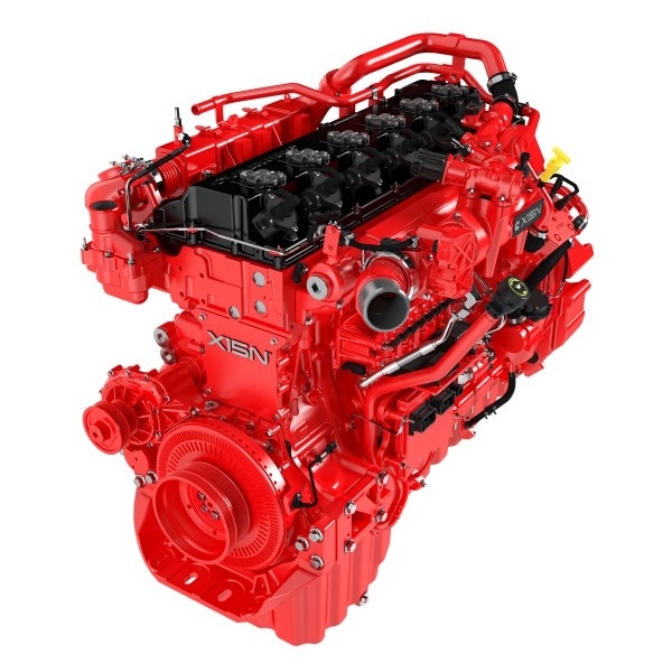 Cummins X15N Engine
Cummins X15N Engine
The X15N is Cummins' newest natural gas offering and the industry's first natural gas engine with a 15-liter displacement and the range and power needed for heavy-duty and long-haul applications. The X15N is capable of meeting stringent 2024 EPA and CARB regulations and provides up to a 10% improvement in fuel economy over the ISX12N.
- Max Horsepower: 500 hp
- Peak Torque: 1,850 lb.-ft.
- Displacement: 15 liters
- Fuel type: CNG, LNG and RNG
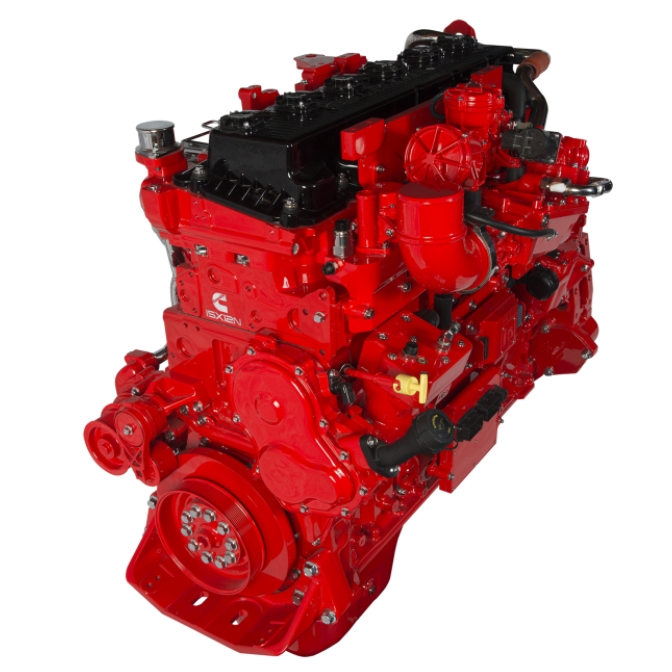
Cummins ISX12N Engine
The ISX12N is a 100% natural gas, spark-ignited engine that is certified to the 2018 CARB Low NOx standard of 0.02 g/bhp-hr. The ISX12N is well suited for heavy-duty regional haul, vocational refuse and motor coach applications.
- Max Horsepower: 400 hp
- Peak Torque: 1,450 lb.-ft.
- Displacement: 11.9 liters
- Fuel type: CNG, LNG and RNG
Available in: Peterbilt Model 579, Peterbilt Model 567 and Peterbilt Model 520
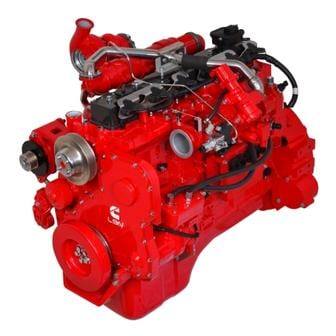
Cummins L9N Engine
The L9N is a 100% natural gas, spark-ignited engine that is certified to the 2018 CARB Low NOx standard of 0.02 g/bhp-hr. The L9N has 90% fewer NOx emissions than current EPA standards and is a great fit for transit, refuse and medium-duty truck applications.
- Max Horsepower: 320 hp
- Peak Torque: 1,000 lb.-ft.
- Displacement: 8.9 liters
- Fuel type: CNG, LNG and RNG
Available in: Peterbilt Model 579, Peterbilt Model 567, Peterbilt Model 520, Peterbilt Model 548, Peterbilt Model 537 and Peterbilt Model 536
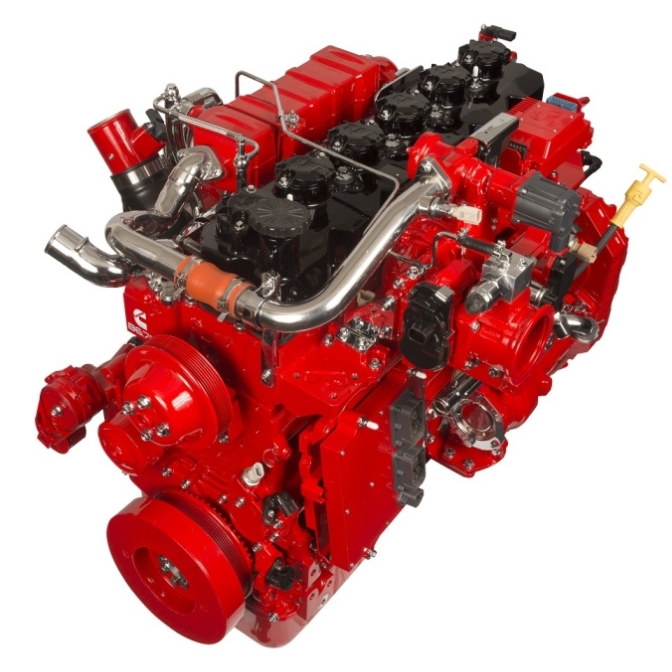 Cummins B6.7N Engine
Cummins B6.7N Engine
The B6.7N is a 100% natural gas, spark-ignited engine and is certified to the 2018 CARB Low NOx standard of 0.02 g/bhp-hr. The B6.7N is designed for school bus, shuttle and medium-duty truck applications.
- Max Horsepower: 240 hp
- Peak Torque: 560 lb.-ft.
- Displacement: 6.7 liters
- Fuel type: CNG, LNG and RNG
Available in: Peterbilt Model 537 and Peterbilt Model 536
Cummins Clean Fuel Technologies CNG Fuel Systems
Cummins Clean Fuel Technologies (CCFT), a joint venture between Cummins and Rush Enterprises, produces CNG fuel systems that fully integrate with multiple truck body manufacturers to provide CNG storage for Class 6 through 8 natural gas vehicles. CCFT offers a variety of system integrations including back of cab, front of body, side mount, roof mount and tailgate mount. Each CCFT fuel system integrates directly with Cummins’ engine control units (ECMs) using exclusive GreenLync™ technology to notify drivers of fuel pressure readings, temperature-compensated fuel levels and distance-to-empty.
The CCFT back of cab CNG delivery system can be integrated with the new Cummins X15N natural gas engine to ensure a fully integrated natural gas powertrain.
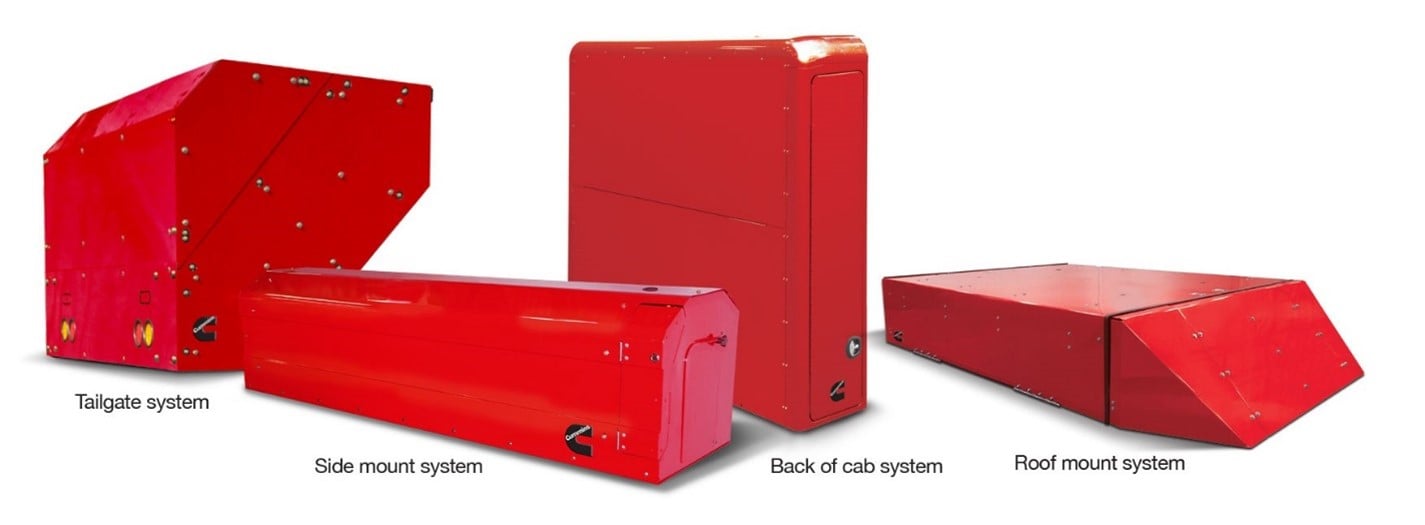
Natural Gas Engine Support from Rush Truck Centers
Rush Truck Centers is the leader in alternative fuel system vehicles and offers natural gas-powered trucks from industry leaders. Our sales specialists are experts in natural gas technologies and can help find the right solution for your business. We also have more than 290 natural gas-certified technicians and dedicated natural gas service bays at Rush Truck Centers locations across the country.
Learn more about our alternative fuel solutions today or contact us to request more information.
COME ALONG FOR THE RIDE. Sign up to receive email updates with our latest promotions, blog posts and news from Rush Truck Centers.

 Back To Blog
Back To Blog



